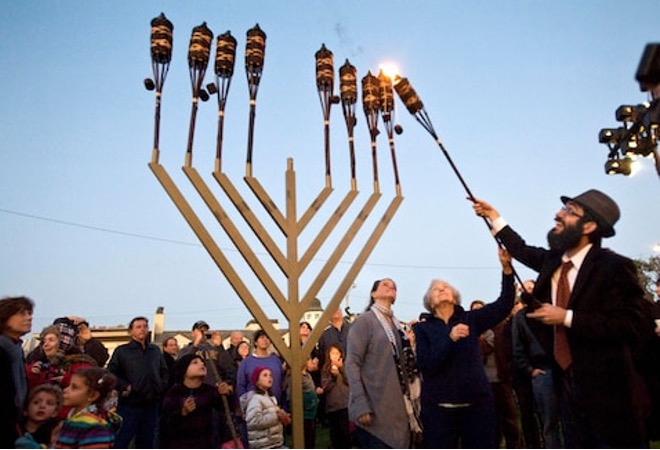HANUKKAH - At the end of the Second Temple period, Jews struggled against the influence of Hellenism and the cultures and armies of Greece and Rome.
They struggled to maintain Judaism and Jewish values and to preserve their independence as a nation-state in Eretz Yisrael – the Land of Israel. Their struggle was not only against external enemies but also internal divisions in a society divided among religious and political factions. They had a Temple, the focus of religious inspiration – at least for many – wise rabbinic authorities, a thriving economy and a powerful army. What happened?
The struggle for Judaism and political independence which we celebrate on Hanukkah by lighting oil-lights, as our ancestors did, must therefore be seen in the context of war.
Hanukkah, the eight-day Jewish festival of lights that begins this year on the evening of Sunday, Dec. 18, commemorates the rededication of the temple in Jerusalem that had been defiled after the Maccabean Revolt, a biblical story that — while it has a few different versions — celebrates the miracle of triumph against overwhelming odds. One part of the miracle, perhaps the part most familiar to today’s celebrants, is the story of how one night’s worth of oil miraculously lasted for eight. That element has inspired many foods eaten to mark Hanukkah, just one of the ways in which the holiday’s traditions have deep origins.
Though the true historical origins of the holiday may be a mystery — there aren’t many reliable sources from that period — it is possible to see how some of Hanukkah’s best-known traditions have evolved over time, particularly as the holiday has taken on more importance in the American Jewish calendar.
It is arguably the case, that the natural tendency of Jews in days ahead of a major Jewish holiday is to extol the virtues of unity and brotherly feelings, as Jews are so family oriented, but I for one, have to disrupt the celebration. Not in my own family, but in the big Jewish family, what some of us refer to fondly as the tribe, what I refer to fondly and historically as the nation, the Jewish nation that is.
In fact, I doubt whether we are one big family, whether we are one nation, and if I have these thoughts, which I wish I did not have, it is because a new religion, some will say a cult is fast emerging among Liberal and Progressive Jews, or those who pretend to be such, and it is called Tikkun Olam.
Those people, among them entire Rabbinical groups such as T’ruah, but not only, take one element out of our vastly rich religious, cultural and historic legacy, and turn it into everything that Judaism should be, their version of Judaism, not the one which most Jews still adhere and cling to.
There is an overriding, fundamental conceptual explanation to what they preach for, and alas, it has almost everything to do with politics, and hardly anything to do with moral values. It is about the brazen attempt of these people to universalize our religion, to strip it of any particular national, distinguishable Jewish context, or if we are to be blatantly honest, to reject the notion of Jewish ethnicity, of Jewish nationalism, and they do so because they object to Zionism, because they do not like the notion of distinct Jewish nationhood.
Yes, because they gave up on Israel, and they will be very comfortable living in a world without Israel. What makes it a clear political, rather than moral concept, is the fact, that they do NOT reject all forms of nationalism, surely not Arab and Palestinian. Well, not a new concept altogether, as anti-Zionism among Jews is nothing new, and when considering the end game of the concept, it is our modern-day version of Jewish assimilationism.
The meaning of Hanukkah can be understood in more than one way, but under no circumstances, it can be understood to be ONLY a festival of lights, of latkes – eating, and of the universal struggle for human rights. For the Tikkun Olam cultists, Hanukkah is EVERYTHING but a celebration of Jewish struggle for religious and national liberation in our homeland.
“It is a domestic, familial occasion, not a synagogue-going one. The holiday requires little cultural or liturgical proficiency on the part of its celebrants,” she says. “It doesn’t take much to observe the holiday—and it’s fun.”
(Mihran Kalaydjian is Vice President Chair Education Public Health / Homelessness Committee - Woodland Hills Warner Center Neighborhood Council and a contributor to CityWatch. [email protected])












